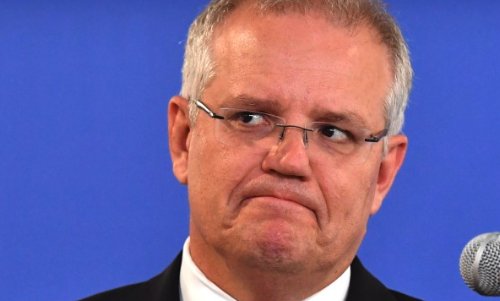
ON LAST Sunday’s 60 Minutes program, reporter Tara Brown aggressively questioned Prime Minister Scott Morrison on why Victoria was closing down schools, whilst the PM advocated that they be kept open.
To start with, it was a dumb question: the head of the Federal government of Australia cannot, nor should he be asked to, answer for the motives of the State of Victoria.
Of more concern is the ignorance of the governance relationship between States and Federal governments displayed by Tara Brown, a lack of understanding sadly widespread in the population at large. The fundamentals of our system of government have never been taught in schools.
CRITICISM
Responding to requests to explain the role of the Federal government in dealing with bushfires, floods and calamities such as the current Coronavirus pandemic, the following is a rough thumbnail run-down (generally accurate, but vulnerable to criticism of over-simplification) of the respective powers of the States and Federal governments.
Australia is a federation in which six separate State governments and the Federal government operate in different sectors of governance. Contrary to popular perception, the Federal parliament is not superior to State parliaments, its powers running parallel to the powers of the States. The relationship of State governments and the Federal (Commonwealth) government is set out in the Australian Constitution.
The Constitution came into being in 1901 when the States, in effect different countries occupying the continent of Australia, decided to come together in an alliance, each State keeping its own parliament, but creating a separate Federal parliament which the States bestowed with powers to legislate in areas, where a unified approach was deemed desirable for the whole of Australia.
s51 of the Constitution sets out the powers given over by the States to the newly created Federal parliament, some of the most well-known being defence, foreign affairs, immigration, customs, currency, taxation, corporations, naturalisation and aliens (non-Australian citizens, not creatures from outer space) etc.
DOCTRINE
The s51 powers are not exclusively vested in the Federal parliament. Under s107, the States can still legislate on the matters set out in s51, but where there is conflict, Federal laws prevail (s109). In addition, if a Federal law purports to deal with a subject matter exhaustively, the doctrine of “covering the field” provides that any State law on the subject matter dealt with in this way, is invalid.
More importantly, s107, known as the residual power provision, unlike s51, sets out no specific powers, but enables the States to legislate freely on any matters affecting the States such as education, health, criminal law, land management etc
In the areas covered by s51, any State law in arguable conflict with Federal legislation is resolved by the High Court, sometimes invalidating the State law and sometimes reading it down to the extent it cannot stand consistently with a Federal law.
During the recent bushfires, the Prime Minister was often taken to task about the failure to take pre-emptive action to minimise bushfires. His retort time and time again, was that it was a matter for the States. Contrary to the perception by some, the PM in his answers was not ducking the issue nor passing the buck: land management as other matters not specifically set out in s51 of the Constitution, are matters the Federal government has no powers to address.
SCHOOLS
Currently there is controversy in NSW as to whether schools should remain open during the ban on social and other gatherings.
The PM has urged children to go to school. His exhortations however, only have advisory status, because the Federal government has no powers in relation to education, which is a State matter implied by s107, the residual powers provision of the Constitution.
CRUISE SHIPS
On March 18, 2020, the Federal government imposed a 30-day ban on cruise ships docking in Australian ports. The next day 2700 passengers from “Ruby Princess” were allowed to disembark in Sydney. One passenger who died overnight, was evacuated to hospital from the ship. Now more than 130 passengers who had dispersed to their homes, have tested positive to COVID-19.
The fiasco involving the “Ruby Princess” is an unfortunate example of how the division of powers between the States and the Commonwealth can lead to confusion and error.
The Federal government which issued the ban, has power under s51 over quarantine. Despite Greg Hunt a minister in the Federal government having the tile “Minister of Health”, he has no relevant power over the broader definition of “health”: that power still vests in the NSW State government under s 107.
In times of crisis, it is of paramount importance that the States and the Commonwealth work closely together to arrive at a working understanding of their respective roles and powers under the Constitution so that disasters like the “Ruby Princess” incident are obviated.PC
JurisDiction











“The PM has urged children to go to school. His exhortations however, only have advisory status, because the Federal government has no powers in relation to education.”
In which case Morrison is out of order, and his actions can serve only to muddy the waters when clarity is of the essence.
“In times of crisis, it is of paramount importance that the States and the Commonwealth work closely together to arrive at a working understanding of their respective roles and powers under the Constitution […]”
I would have thought that it would have been incumbent on all parties to have had a “working understanding of their respective roles and powers under the constitution” as a matter of course, and not to have had to wait until the onset of a calamity. All these people are very handsomely remunerated, yet it appears that they haven’t bothered to familiarise themselves the requirements of their jobs – perhaps they find it boring having to deal with such minutiae.
We shouldn’t be surprised at any of this, of course; it’s exactly the outcome that is to be expected from putting someone from marketing in charge of running a country.
This is the type of quality commentary hidden from the curious. Well done Mr Laucis.